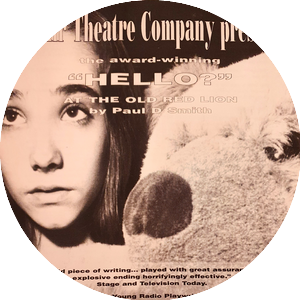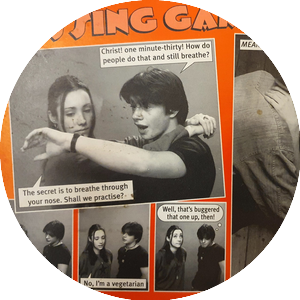Motivation
Whilst studying Drama for my A-Levels, a Little Red Riding Hood obsession led me to Angela Carter’s The Bloody Chamber and Other Stories, her collection of sexed up fairy tales. My final exam performance / writing piece was an adaptation of The Company of Wolves in five minutes. With my first play Hello? being performed in London, I was already trying to think what my next play would be. It didn’t take long to decide that I should expand my exam piece.
Inspiration
Aside from The Company of Wolves and its companion story The Werewolf, Wolfsong was inspired by an episode of a BBC2 documentary series called Magic Animals. This episode – The Wolf – focused on the mismatch between the wolf in fairytale and the wolf in nature, and fed a lot into the portrayal of the Wolf – and the villagers – in Wolfsong.
Another strong influence was Theatre de Complicite’s The Three Lives of Lucie Cabrol – an epic tale that showed an entire village across the span of history with only a handful of actors. The play was a physical theatre piece, with the cast using mime, acrobatics and brilliant acting to paint pictures on an otherwise bare stage. It has made me want to write something similar for years, but Wolfsong was my first real attempt.
Getting the Story
The story for Wolfsong came very easily. Fusing Carter’s idea of a Red Riding Hood complicit in – leading – her seduction by the wolf with Magic Animals’ victim of human aggression and fear was simple enough, but provided more than enough meat to expand five minutes into a full-length play. The image of the actors using pikes to simulate rifles and gunfire wove itself into the story, and again I found that I had written a script almost without trying. Certainly without any of the hard work that should have gone into it.
Outside Help
It was around this time that I decided I wasn’t going to ask Jez Simons – drama teacher and writer – for his opinion on my work. He had commented on my only other plays – Hello? and The Kissing Game – before I’d sent them to director Tim Crook, and in both cases I suspected the best things about the plays were his suggestions. My self-confidence was at a low ebb, and I wanted to prove to myself that I could get a play produced without Jez’s insight.
This was – of course – a stupid waste of an opportunity. But even with hindsight, I think it was something I needed to do at that point.
The Pitch
I first thought about showing Wolfsong to Tim Crook instead of The Kissing Game, but I decided that he would prefer a more naturalistic drama. This is one of my blindspots – assuming that producers I don’t really know are primarily interested in naturalism: if I had have shown it to Tim, who knows if things would have gone differently with my career in theatre.
Working on an adaptation of Angela Carter’s Wolfsong was an excellent decision and I am sure [Dale] would have gained so much from dramatizating the writing of such a significant writer. But it is unlikely IRDP would have been able to afford the rights to produce a stage version.
It was sent to the Haymarket Theatre – who rarely produced new plays, and didn’t want to change that policy for this one. I couldn’t think of anywhere else for it to go, and so it went into a drawer. But I remained fond of it, and when I ended up invited to an event at the Theatre Royal Northampton, I got talking to their Director of Education Sean Aita about it. He said he’d be happy to read it, and so I sent it over to him.
Wolfsong wasn’t produced by the Theatre Royal.
Sean’s feedback was that the play was interesting, but he didn’t know enough of Angela Carter’s work to know if Wolfsong was so close as to need copyright permission, and – more crucially – he didn’t think it had the educational content to warrant him buying it. But he did like it enough to ask me to send him the next thing I did that might be suitable for the education department. That next play was A Northamptonshire Tale, which Sean did like enough to buy.
But Wolfsong went back in the drawer.
Then, when I went to university, I discovered a company of recent graduates called K486 had set up a student writing competition. The competition was small, but one of the judges was then artistic director of the Royal Exchange Theatre Manchester Sarah Frankcom.
I entered Wolfsong in the competition, and it didn’t win.
It did, however, come an honourable second and gave me the opportunity to get in touch with Sarah about my writing. She was happy to read some other plays that I had ready, and that eventually led to me being invited to join the theatre’s First Eleven writers’ group. I spent a lot of time in the company of writers like Danny Brocklehurst, and saw some of my work produced in the Royal Exchange’s studio space.
The next year, I entered A Night on the Tiles in the same competition.
Wolfsong has never been produced – although whilst I was in Edinburgh with The Lunatic, I did discover that a director called Jonathan Holmes had devised a Carter adaptation called Wolfsong which was being performed a few venues down from me. But even without ever being sold itself, it has proved a useful calling card script. It has got me more work than any of my produced plays ever have.


